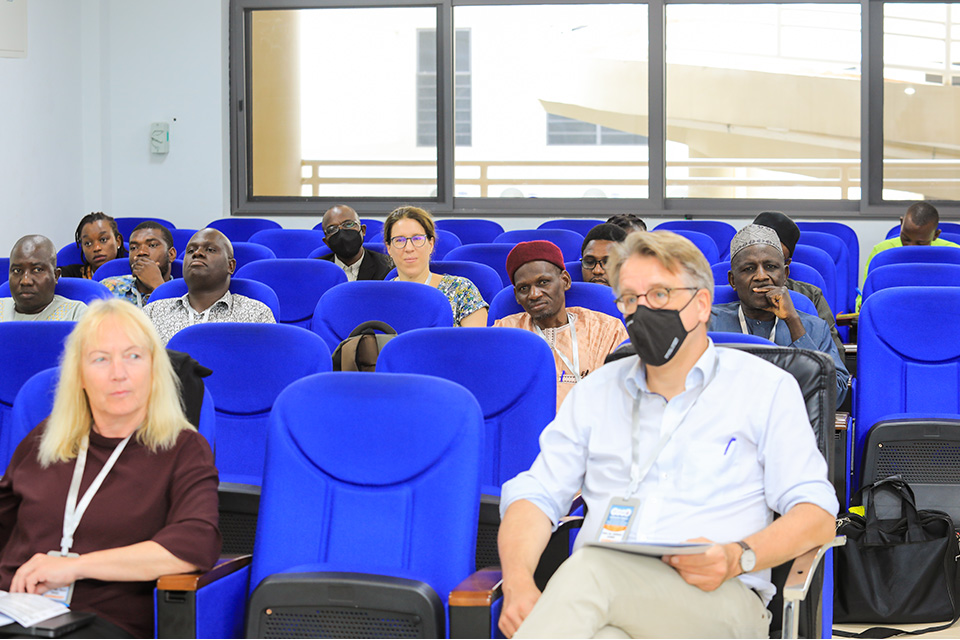CIP-UEW Hosts Workshop on Models for Digital Data Literacy in Africa

The Centre for International Programmes, University of Education, Winneba (CIP-UEW), in association with the University of Hamburg, has hosted a weeklong workshop on models for digital data literacy in Africa and digital repositories as open educational resources.
The five-day workshop, which was held at the Students Centre Conference Room III from Monday, 3rd October to Friday, 7th October, 2022, attracted participants from all around the globe who presented their research on digital data literacy and repositories.
The research topics included “Digital Archiving and the Establishment of Satellites/Central Open Access Repositories in Nigerian Universities; Future Collaborations in Digitisation and Open Science Projects: Needs and Challenges from the Perspective of a German Social and Cultural Anthropology Library; Digital Data Literacy Competencies: The Role of University Teacher Training; History Education as Active Learning of Historical Thinking Using (Digitally Archived) Resources” and many more.

Representing the Vice-Chancellor of UEW, Prof. Mawutor Avoke at the opening of the workshop, the Dean, School of Graduate Studies, Prof. Samuel Kwesi Asiedu-Addo, observed that digital data literacy (DDL) goes beyond using computers and communicating online to a fundamentally critical understanding of data collection, storage, analysis, and visualisation processes, reflecting the effects of contemporary data practises in daily life, science, politics, and business.
“As the world continues to change, we will do more of what we do digitally. As a result, there are many ramifications for our students and the future of our society. There are consequences to how we interact with others. We have seen a rise in disinformation in the form of news stories synthesised with data to create civil unrests that have threatened democratic institutions.
“Without building DDL skills, we will be taking a major risk with our future as we will be failing to educate a populace who would not have an appreciation of DDL to distinguish between real and fake content online,” he stated.

The Vice-Chancellor’s representative emphasised the value of funding the integration of pedagogy into DDL instruction. “We must include DDL components within current professional development and university teacher preparation programmes. We must teach our students how to use their writing to create social media posts and digital portfolios, for example. We can teach our students how to collect, organise, transform, and communicate that data.”
Prof. Samuel Abeiku Hayford, a professor at the Faculty of Educational Studies, UEW, bemoaned Africa's struggle to make indigenous knowledge readily available, accessible, and user-friendly. "We have indigenous knowledge. For instance, we essentially apply science at home rather than document it in a textbook. This shows that we haven't been able to record or highlight how we use science."

He advised the use of digital platforms to synchronise academic knowledge with indigenous knowledge so that researchers might meaningfully apply indigenous knowledge to formal studies.
"COVID-19 exposed certain things that we have been overlooking. Do we have the capacity to spread this digital information across the length and breadth of our continent without disadvantaging those who have already been disadvantaged? So, as we talk about turning things into digital form, we should also be talking about the disparities and those who may be excluded," he said.
One of the conveners of the workshop, Prof. Telse Iwers, recounted the development of the conference. She disclosed that the UEW and the University of Hamburg had developed a partnership over the last few years working together on some projects for the internationalisation of teacher education. “One of the projects is called tri-continental teacher training. It is an idea founded on exchange programmes for pre-service teachers at the University of Hamburg, University of North Carolina, and UEW.”

Henning Schreiber, also a convener, expressed appreciation to all those who contributed in diverse ways to make the conference possible. “First and foremost, I would like to thank the organisers; again, my special thanks to the initiator, Issa Fofana, and the coordinator, Prof. George Dandy Dampson.”
All the staff at CIP, particularly the Dean, Prof. Charles K. Assuah, and the Vice-Dean, Dr. Harrison Golo, played an instrumental role in making the weeklong conference successful.












